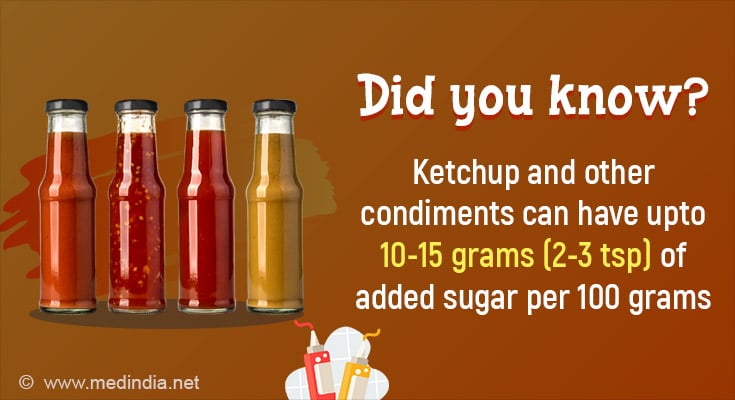- Hidden sugars in condiments pose health risks like obesity and dental decay
- Moderation and mindful label reading are crucial to avoid sugar overload
- Embrace healthier alternatives like herbs, vinegar, and citrus zest for flavor
Condiments like ketchup have long been the unsung heroes of the culinary world, effortlessly transforming ordinary dishes into extraordinary delights. However, nestled within their savory and tangy profiles lies a concerning secret â added sugar (1✔ ✔Trusted Source
Effects of tomato ketchup and tomato paste extract on hepatic lipid accumulation and adipogenesis
).
As consumers, we often overlook the sugar content lurking within these seemingly innocent bottles of ketchup and sauces. Yet, the truth is staggering: the sugar content in some of these condiments rivals that of a chocolate bar or a can of soda.
Dr. Hansaji Yogendra, the director of The Yoga Institute, sheds light on this pervasive issue, stating, âThe average Indian may unknowingly consume over 20 kilograms of added sugar from condiments like sauces and ketchup alone over a year.â This revelation prompts us to go deeper into the sugar spectrum and confront the hidden dangers of excessive sugar consumption.
Some sauces contain as much sugar as a chocolate bar! #sauce #ketchup #sugar #medindia’
Advertisement
Mindful Consumption: Navigating Portion Control and Label Reading
The sugar spectrum spans a wide range, from the familiar white and brown sugars to high-fructose corn syrup, glucose, fructose, agave nectar, and others. Dr. Hansaji emphasizes the importance of reading labels carefully to empower consumers to make informed choices and avoid unexpected sugar traps lurking in condiment bottles. On average, commercial condiments like ketchup may contain around 10-15 grams (2-3 tsp) of added sugar per 100 grams, she notes.
Advertisement
Moderation is the Key: Managing Sugar Consumption from these Condiments
Moderation emerges as a crucial principle when navigating the realm of store-bought condiments. While a dash of sauce can undoubtedly elevate a dish’s flavor profile, excessive indulgence may pave the way for sugar-laden regrets. Portion control becomes imperative, allowing for the enjoyment of flavors without succumbing to sugar overload.
The impact of unchecked sugar consumption extends beyond mere taste preferences; it exacts a toll on health, affecting various bodily systems. Excessive sugar intake fuels a surplus of calories, promoting weight gain and obesity.
Moreover, added sugars contribute to insulin resistance, type 2 diabetes, and cardiovascular woes. Sugary condiments like ketchup also pose a threat to dental health, nurturing tooth decay and cavities. Dr. Hansaji further warns against the fleeting high of sugar consumption, which gives way to energy crashes, leaving one feeling drained and lethargic.
Advertisement
Wondering How Much Sugar Is in Common Condiments? Here is a Sneak-Peek
- Ketchup: 10-15 grams of added sugar
- BBQ sauce: 20-25 grams of added sugar
- Sweet chili sauce: 20-25 grams of added sugar
- Teriyaki sauce: 15-20 grams of added sugar
- Hoisin sauce: 15-20 grams of added sugar
- Honey mustard: 15-20 grams of added sugar
- Thousand Island dressing: 10-15 grams of added sugar
- Cocktail sauce: 15-20 grams of added sugar
- Worcestershire sauce: 5-10 grams of added sugar
- Tartar sauce: 5-10 grams of added sugar
Healthier Alternatives: Embracing Flavorful Substitutes for Added Sugar
Amidst these alarming revelations, it becomes imperative to seek sweet alternatives that satiate cravings for flavor without succumbing to the temptations of added sugars. Consider incorporating delightful substitutes into your culinary repertoire:
Herbs and Spices: Infuse your dishes with aromatic herbs and spices, from mint and coriander to cumin and pepper, offering both flavor and health benefits.
Tangy Vinegar: Elevate salads and dressings with the addition of vinegar, such as apple cider or rice vinegar, providing a refreshing alternative to sugar-laden sauces.
Zesty Citrus: Brighten up your dishes with the vibrant zest of lemons, limes, and oranges, adding zestiness without the sugar.
In addition to mindful condiment consumption, cultivating a lifestyle that nurtures body, mind, and soul is paramount. Incorporate simple practices into your daily routine:
Wholesome Diet: Nourish your body with a rainbow of fresh, seasonal, locally available fruits, vegetables, and whole grains.
Regular Physical Activity: Engage in activities like yoga, sports, dancing, or nature walks, making them a regular part of your routine.
In conclusion, awareness is key to combating the hidden sugar epidemic present in store-bought condiments. By making informed choices, exercising moderation, and embracing healthier alternatives, we can safeguard our well-being and savor the true essence of culinary indulgence.
Reference:
- Effects of tomato ketchup and tomato paste extract on hepatic lipid accumulation and adipogenesis – (https://www.ncbi.nlm.nih.gov/pmc/articles/PMC10195947/)
Source-Medindia









